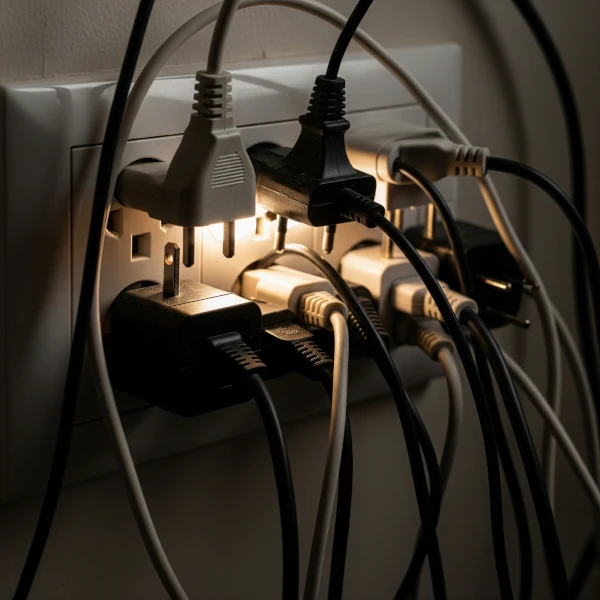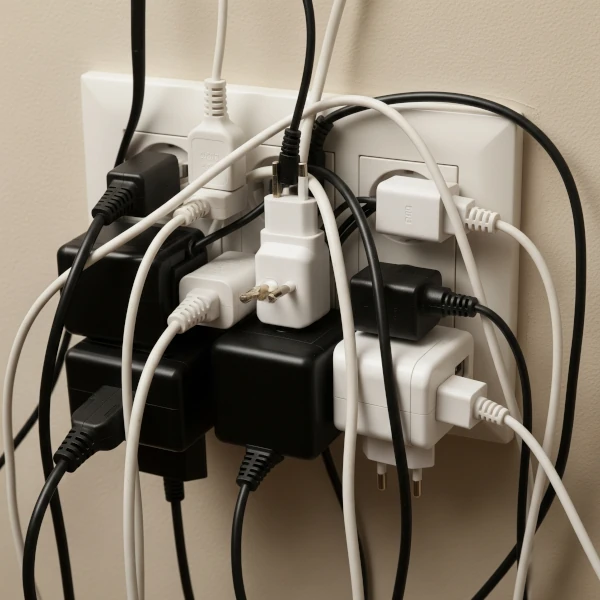
As a tenant, your role in ensuring the overall safety of your home is crucial, and mastering electrical safety tips for tenants is a fundamental part of that. Beyond electrical hazards, understanding the importance of functioning CO detectors and having a solid fire escape plan are equally vital for preventing accidents, fires, and even serious injuries. Let’s dive into these essential electrical practices to keep your living space safe.
The Dangers of Overloaded Outlets: A Core Electrical Safety Concern
One of the most common electrical hazards in homes is an overloaded outlet. When you plug too many devices into a single outlet, it can draw more electricity than the circuit is designed to handle. This can lead to overheating, tripped circuit breakers, and, in severe cases, electrical fires.
Look at this image below. This is a classic example of what not to do. An outlet crammed with multiple plugs, power strips plugged into other power strips – it’s a recipe for disaster. The sheer number of cords and adapters indicates a significant risk.

Preventing Overloaded Outlets: Key Electrical Safety Tips
To ensure electrical safety for tenants and prevent overloaded outlets, consider these tips:
Distribute your devices: Instead of plugging everything into one outlet, spread your electronics across different outlets in the room or even different rooms, if feasible. This is a crucial electrical safety tip.
Use power strips wisely: Power strips can be helpful, but they don’t increase the amount of power available from the outlet. They simply allow you to plug in more devices. Never plug one power strip into another (this is called “daisy-chaining”).
Be mindful of high-wattage appliances: Appliances like microwaves, toasters, hair dryers, and space heaters draw a lot of power. Avoid plugging these into the same outlet or circuit as other high-demand devices.
Look for signs of overload: If an outlet feels warm to the touch, you smell burning plastic, or your circuit breaker frequently trips, you likely have an overloaded circuit. Unplug some devices immediately. These are important signs for tenant electrical safety.
Proper Cord Use: A Simple Yet Critical Habit for Rented Homes
Electrical cords are often overlooked, but their proper use is vital for tenant electrical safety. Damaged or misused cords can lead to shocks, short circuits, and fires.
Essential Tips for Proper Electrical Cord Use:
Inspect cords regularly: Check all electrical cords for fraying, cracks, exposed wires, or any signs of damage. If a cord is damaged, replace it immediately. Do not attempt to repair it with electrical tape.
Avoid running cords under carpets or rugs: This can cause cords to overheat, become damaged, and pose a tripping hazard.
Don’t pinch or crimp cords: Avoid placing furniture on top of cords or running them through doorways where they can be pinched. This can damage the internal wiring, compromising your home’s electrical safety.
Pull from the plug, not the cord: When unplugging a device, always grasp the plug itself, not the cord. Pulling on the cord can damage the wiring inside the plug or the appliance.
Use cords for their intended purpose: Don’t use indoor extension cords outdoors, and ensure extension cords are rated for the power requirements of the devices you’re plugging into them.
Unplug unused appliances: When not in use, unplug small appliances like toasters, coffee makers, and hair dryers. This not only saves energy but also reduces the risk of accidental activation or electrical faults, contributing to overall electrical safety.
Conclusion:
By implementing these basic electrical safety tips for tenants, you can significantly reduce the risk of electrical hazards in your rented home. A little prevention goes a long way in keeping you and your property safe!
- Ready to comply with Victoria’s rental laws? Book your Electrical check for $200 + GST

